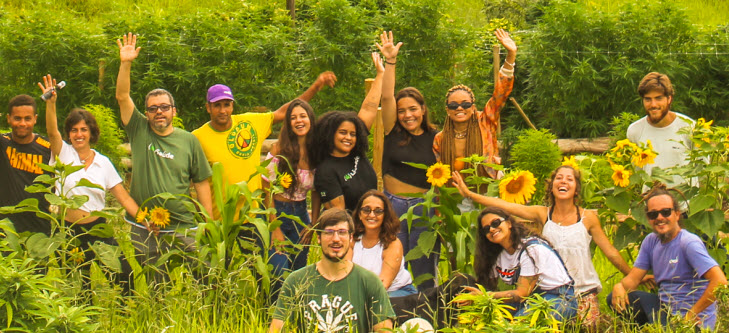Teenager Sofia Langenbach has been using cannabis since she was five years old.
She was just a toddler when her parents planted three cannabis sativa plants on the balcony of the family’s apartment in Botafogo, southern Rio, in 2016.
Growing this type of plant is prohibited by law in Brazil.
Still, lawyer Margarete Brito and designer Marcos Langenbach, the girl’s parents, planted the “little garden” anyway because Sofia is a carrier of a rare congenital syndrome and depends on the oil extracted from cannabis to avoid suffering severe seizures.

Shortly after that, the family obtained the country’s first court order allowing cultivation for medicinal purposes and ensuring the safety of the treatment.
The seedlings yielded more oil than Sofia needed, and her parents donated the surplus to other families of patients with nervous disorders.
The more they donated, the more people asked for it.
As production increased, the porch became too small.
They moved to a house in Urca, but the yard was not enough even there.
In 2020, Marcos and Margarete established Brazil’s first cannabis farm in Paty do Alferes, in the state of Rio de Janeiro.
This, in a nutshell, is the story of the Medical Cannabis Patient and Research Support Association (Apepi), which brings together doctors, researchers, and lawyers and now serves some 6,000 registered families across Brazil.
Last month, the facility distributed over 3,000 bottles of cannabis oil to patients who had a prescription to consume different cannabis products.
The facility’s history is told in the documentary ‘Sofia’s Other World,’ which will be shown on ‘Globoplay’ starting Tuesday (9).
“The film helps us break the bubble and show our work to those who do not yet agree with what we are doing.”
“We need to inform to change.”
“Cannabis faces a lot of prejudice in society, even regarding the medical use of the plant,” says Margarete, who sees no difference between the cause of medical cannabis and the fight to legalize its use in general.
“The plant is the same. I think it’s important to regulate cultivation and consumption in all forms.”
“It’s necessary to prevent abuse as it happens with alcohol or sugar.”
“But the law needs to change. What’s wrong is the law,” she adds.
With statements from researchers such as neuroscientist Sidarta Ribeiro, the documentary shows a reality different from 2014.
At that time, the feature film ‘Ilegal: A Vida não espera” (Illegal: Life Doesn’t Wait) was released, which told the drama of Sofia and other children whose families struggled to obtain medicines made with cannabis, which were only available abroad, were very expensive and could not even be imported.
Since then, the National Health Agency (Anvisa) has established rules for acquiring these medicines, associations have obtained the right to grow them through court orders, and the consumption of cannabis-based products has created a national market.
NATIONAL CRUSADE
When “O Globo” (a Brazilian daily newspaper published in Rio de Janeiro) first met Margarete and Sofia in 2016, they did not have an injunction guaranteeing to plant cannabis.
But the lawyer turned one family’s fight into a crusade of national magnitude, rallying hordes of people behind the medicine.
Without that “cannabis march,” something like the cannabis farm in Paty do Alferes, which now employs 60 people under a legal contract, would never have been possible.
But legal uncertainty is a huge obstacle.
Various associations have obtained injunctions to start cultivation.
Apepi had obtained a legal notice to produce and distribute the oil.
But the measure was overturned in the second instance late last year, and since then, the group has been operating based on civil disobedience, according to Margarete.
“O outro mundo de Sofia” (Sofia’s Other World) shows when police officers investigating a complaint entered the farm in six cars to seize cannabis plants and take those responsible to the police station.
“Our lawyer immediately filed a complaint, and the courts overturned the search and seizure order.”
“At the same time, the police officers saw our lab and all the work and realized that the crop was not for trade,” says the Apepi founder.
In one documentary passage, Margarete attends public hearings in the National Congress and debates with politicians who oppose more flexible cannabis legislation.
The conservative wing of the House even accepts the importation of medicines based on the plant and the production of synthetic substances that reproduce the effects of substances such as CBD and THC found in cannabis.
However, many parliamentarians refuse to discuss cultivation legalization in Brazil.
They claim it would facilitate the diversion of production for so-called “recreational use.”
“We demand the legalization of cultivation and distribution.”
“Universities want to do research with the plant and the oil, but they are not getting anywhere because of the ban.”
“The result is that we are at an impasse.”
“Some say that cultivation cannot be authorized because there is no research in Brazil that proves the effectiveness of these drugs.”
“But if the ban remains in place, there is no way to move forward with research,” the lawyer says.
“We want to talk to those who are against it.”
“When that person understands what we are doing, change begins.”
“Sometimes it’s tiring to discuss so much, but it’s necessary.”
“And if I were afraid, none of this would have happened,” she adds.

